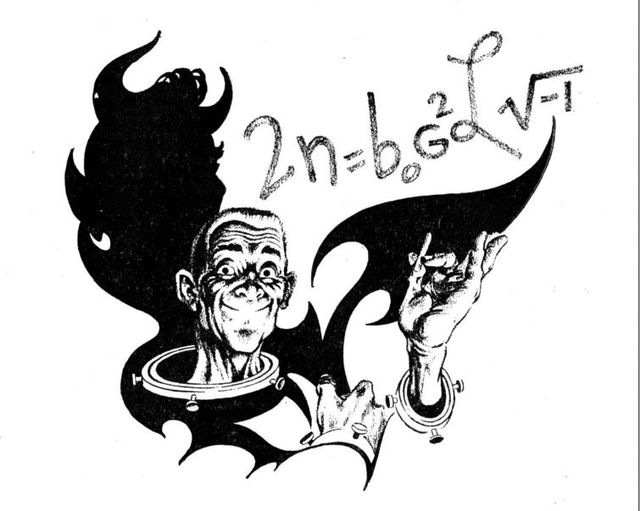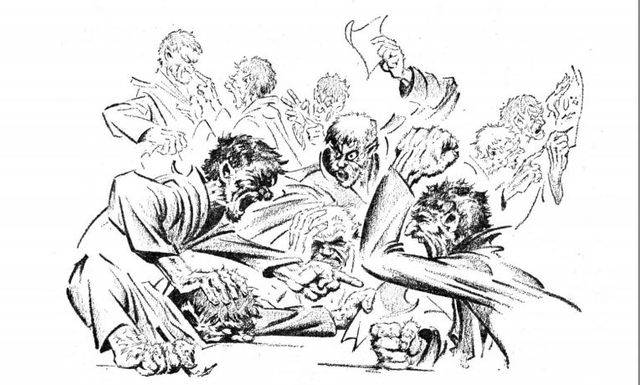-
Vijay Fafat
- Published on
This is the first of 2 stories which Eric Frank Russell wrote about aliens who get outwitted by smart, mathematically-minded earthmen who use strategies involving seemingly paradoxical logic to gain their freedom (the other was “Now Inhale”, which appeared in Astounding Science Fiction in April 1959 involving the Tower of Hanoi puzzle)
The yarn is a first-contact story written in the typical comedic style of Eric Frank Russell. Wayne Hillder is a space-faring loner who lands on an alien planet inhabited by the “Vards”. The aliens, it turns out, are no slouches, having a space-empire spanning dozens of solar systems. The Vards hold Hillder as a visitor, not as a prisoner, and an alien named “Parmith” is assigned to teach him the local language.
“Parmith said hurriedly, “We must get on with this task. An important commission is waiting to interview you as soon as you can converse with ease and clarity.”
The Commission, composed of 400 of the most powerful members of the Vard empire, is charged with determining the nature of threat represented by the humans. During his public question, Hillbert makes a very funny use of Zeno’s paradox (and also purposely makes an obviously wrong claim about infinite series)]:
“Your science of ballistics cannot be advanced after so much neglect.”
“It could never advance,” said Hillder. That’s why we abandoned it. We dropped fiddling around with bows and arrows for the same reason. No initial thrust can outpace a continuous and prolonged one. Thus far and no farther shalt thou go.”
Then he added by way of speculative afterthought, “Anyway, it can be shown that no bullet can overtake a running man.
“Nonsense!” exclaimed Shahding, having once ducked a couple of slugs himself .
“By the time the bullet has reached the man’s point of departure the man has retreated,” said Hillder. “The bullet then has to cover that extra distance but finds the man has retreated farther. It covers that too, only to find that again the man is not there. And so on and so on.”
“The lead is reduced each successive time until it ceases to exist,” Shahding scoffed.
“Each successive advance occupies a finite length of time no matter how small,” Hillder pointed out. “You cannot divide and subdivide a fraction to produce zero. The series is infinite. An infinite series of finite time-periods totals an infinite time. Work it out for yourself. The bullet does not hit the man because it cannot get to him.”
The reaction showed that the audience had never encountered this argument before or concocted anything like it of their own accord. None were stupid enough to accept it as serious assertion of fact. All were sufficiently intelligent to recognize it as logical or pseudo-logical denial of something self-evident and demonstrably true. Forthwith they started hunting for the flaw in this alien reasoning, discussing it between themselves so ‘noisily that perforce Shahding stood in silence waiting for a break. “I am wondering whether you are a major criminal seeking sanctuary among us. There may be some other reason. Whatever it is, you do not hesitate to betray your own He put on the same smile again. “It would be nice to know why you have been so cooperative.”
“That’s an easy one,” Hillder said, smiling back in a way that Kadina did not like. “You see, I am a consistent liar.” With that, he left his seat and walked boldly to the exit. The guards led him to his cell…
[…]
Bulak looked mournful. “I’m a refugee from the fog.”
“What fog ?”
“The one you’ve spread all over the place.” He rubbed a fur-coated ear, examined his fingers, stared at the wall. “The Commission’s main purpose was to determine relative standards of intelligence, to settle the Prime question of whether your kind’s cleverness is less than, greater than or equal to our own. Upon that and that alone depends our reaction to contact with another space-conqueror.
“I did my best to help, didn’t I?”
“Help?” echoed Bulak as if it were a new and strange word. “Help ? Do you call it that ? The true test should be that of whether your logic has been extended farther than has ours, whether your premises have been developed to more advanced conclusions.
“Well?”
“You ended up by trampling all over the laws of logic. A bullet cannot kill anybody. After three days fifty of them are still arguing about it and this morning one of them proved that a person cannot climb a ladder. Friends have fallen out, relatives are starting to hate the sight of each other. The remaining three hundred and fifty -are in little better state.”
“What’s troubling them ?” inquired Hillder with lively interest.
“They are debating veracity with everything but brickbats,” Bulak informed, somewhat as if compelled to mention an obscene subject. “You are a consistent liar. Therefore, the statement itself must be a lie. Therefore, you are not a consistent liar. The conclusion is that you can be a consistent liar only by not being a consistent liar. Yet you cannot be a consistent liar without being consistent.”
“That’s bad,” Hillder sympathized.
“It’s worse,” Bulak gave back. “Because if you really are a consistent liar—which logically is a self contradiction—none, of your evidence is worth a sack of rotten munaseeds. If you have told us the truth all the way through then your final claim to be a liar must also be true. But, if you are a consistent liar, then none of it is true.”
“Take a deep breath,” advised Hillder.
“But,” continued Bulak, taking a deep breath, “since that final statement must be untrue all the rest may be true.” A wild look came into his eyes and he started waving his arms around. “But the claim to consistency makes it impossible for any statement to be assessed as either true or untrue because, on analysis, there is an unresolvable contradiction that—”
“Now, now,” said Hillder, patting his shoulder. “It is only natural that the lower should be confused by the higher. The trouble is that you’ve not yet advanced far enough. Your thinking remains a little primitive.”
It is, of course, surprising that the Vards do not think of finite summation of infinite series…
By the end of it, the Vards also show themselves to be capable of advanced logic (despite falling short on infinite series), employing Bayesian analysis to conclude that the human civilization must be significantly more advanced than the Vards. They let Hillder head back, hoping to start diplomatic relations with the humans.
The story finishes on a bit of a funny note (and a mathematical one referencing an attempt to disprove the Continuum Hypothesis, though potentially erroneously):
“He glanced over his tiny library fastened to a steel bulkhead. Two tomes were missing. They had swiped the two that were replete with diagrams and illustrations. They had left the rest, having no Rosetta Stone with which to translate cold print. They hadn’t’ touched the nearest volume titled : “Diabologic, the Science of Driving People Nuts.” Sighing again, he took paper from a drawer , commenced his hundredth, two hundredth or maybe three hundredth try at concocting an Aleph number higher than A1 but lower than C. He mauled his hair until it stuck out in spikes, and, although he didn’t know it, he did not look especially well balanced himself.”
I hope the author used “A1” to represent “Aleph-null”, the countable infinity of natural numbers, though it is not clear, and there is scope for confusion that he might have mistakenly used “A1” to mean “Aleph-1”, in which instance the last sentence is not an attempt at refuting the Continuum hypothesis but something different (it being fairly obvious that “C” is being used to represent the cardinality of real numbers, though not so stated in the text)
On a related note, in the original “Star Trek” series, an episode titled “I, Mudd” has a race of androids from another galaxy. They plan to mend humanity’s ways by taking over their affairs, serving them, and preventing them from being illogical and self-destructive. At the end, Spock, Kirk and crew flummox the master android by deploying the phrase, “everything he says is a lie”, which sends the android in an infinite loop of smoke. This device of having a Cretan declare, “All Cretans are Liars!” appears to have been a well-used meme in logic fiction.

